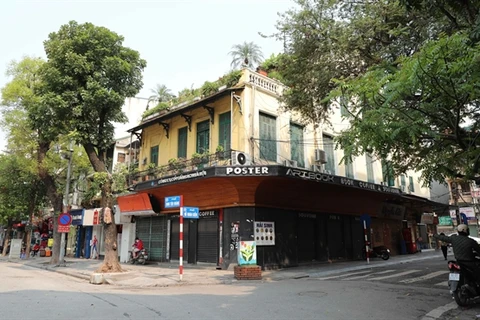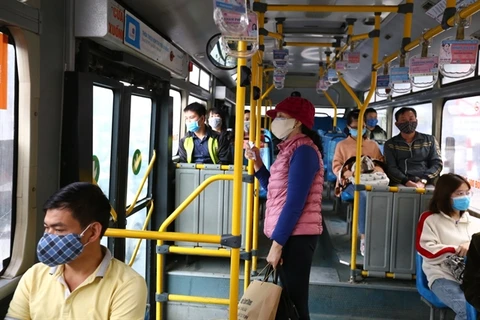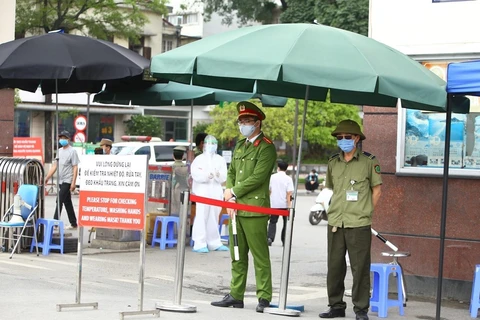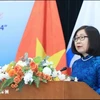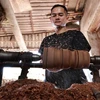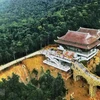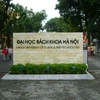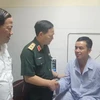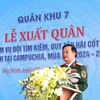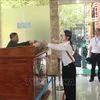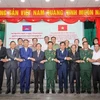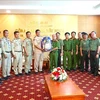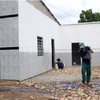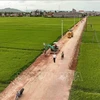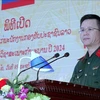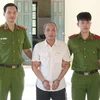 Amid COVID-19 outbreak, many tourist hot spots in the capital city of Hanoi close their doors to prevent the spread of the virus. Both historical relic sites and popular tourist destinations located throughout Hanoi have been temporary closed whilst thorough disinfectant measures aimed at preventing the further spread of the novel coronavirus (COVID-19) are carried out. To ensure safety for visitors, Hanoi authorities have also closed the Temple of Literature and Ngoc Son Temple for disinfection. Le Xuan Kieu, Director of the Temple of Literature's Cultural and Scientific Centre, said that they have temporarily closed the site to carry out disinfection work and train staff about virus prevention. (Photo: Mai Mai/Vietnamplus)
Amid COVID-19 outbreak, many tourist hot spots in the capital city of Hanoi close their doors to prevent the spread of the virus. Both historical relic sites and popular tourist destinations located throughout Hanoi have been temporary closed whilst thorough disinfectant measures aimed at preventing the further spread of the novel coronavirus (COVID-19) are carried out. To ensure safety for visitors, Hanoi authorities have also closed the Temple of Literature and Ngoc Son Temple for disinfection. Le Xuan Kieu, Director of the Temple of Literature's Cultural and Scientific Centre, said that they have temporarily closed the site to carry out disinfection work and train staff about virus prevention. (Photo: Mai Mai/Vietnamplus)  The Management Board of Van Mieu (Temple of Literature) - Quoc Tu Giam, a famous tourist attraction in the city, announced to close the site from March 13 .Van Mieu is a temple dedicated to Confucius in Hanoi, northern Vietnam. The temple also hosts the Imperial Academy Vietnam's first national university. The temple was built in 1070 at the time of Emperor Ly Thanh Tong. It is one of several temples in Vietnam which is dedicated to Confucius, sages and scholars. The temple is located to the south of the Imperial Citadel of Thang Long. The various pavilions, halls, statues and steles of doctors are places where offering ceremonies, study sessions and the strict exams of the Dai Viet took place. (Photo:Mai Mai/Vietnamplus)
The Management Board of Van Mieu (Temple of Literature) - Quoc Tu Giam, a famous tourist attraction in the city, announced to close the site from March 13 .Van Mieu is a temple dedicated to Confucius in Hanoi, northern Vietnam. The temple also hosts the Imperial Academy Vietnam's first national university. The temple was built in 1070 at the time of Emperor Ly Thanh Tong. It is one of several temples in Vietnam which is dedicated to Confucius, sages and scholars. The temple is located to the south of the Imperial Citadel of Thang Long. The various pavilions, halls, statues and steles of doctors are places where offering ceremonies, study sessions and the strict exams of the Dai Viet took place. (Photo:Mai Mai/Vietnamplus)  People have to give up their daily exercise around the Temple of Literature’s garden as it has closed to visitors amid coronavirus outbreak . Van Mieu is a temple dedicated to Confucius in Hanoi, northern Vietnam. The temple also hosts the Imperial Academy Vietnam's first national university. The temple was built in 1070 at the time of Emperor Ly Thanh Tong. It is one of several temples in Vietnam which is dedicated to Confucius, sages and scholars. The temple is located to the south of the Imperial Citadel of Thang Long. The various pavilions, halls, statues and steles of doctors are places where offering ceremonies, study sessions and the strict exams of the Dai Viet took place. (Photo: Mai Mai/ Vietnamplus)
People have to give up their daily exercise around the Temple of Literature’s garden as it has closed to visitors amid coronavirus outbreak . Van Mieu is a temple dedicated to Confucius in Hanoi, northern Vietnam. The temple also hosts the Imperial Academy Vietnam's first national university. The temple was built in 1070 at the time of Emperor Ly Thanh Tong. It is one of several temples in Vietnam which is dedicated to Confucius, sages and scholars. The temple is located to the south of the Imperial Citadel of Thang Long. The various pavilions, halls, statues and steles of doctors are places where offering ceremonies, study sessions and the strict exams of the Dai Viet took place. (Photo: Mai Mai/ Vietnamplus)  Thang Long Imperial Citadel has stopped receiving visitors since March 14. Thang Long Conservation Center - Hanoi announced that it would reopen under the direction of the City People's Committee. The ancient site was the political centre of the country for 13 consecutive centuries and served as the capital of Vietnam for eight centuries. A notable attraction in the Imperial Citadel of Thang Long was the Hanoi Flag Tower, a renovated 40-metre-tall stone fortress offering expansive views of Ba Dinh Square and Hanoi City Centre. Located in Ba Dinh District, entrance to the Imperial Citadel of Thang Long is priced at VND 30,000 and it is open from 08:00 to 17:00 every day except Monday. (Photo: Mai Mai/Vietnamplus)
Thang Long Imperial Citadel has stopped receiving visitors since March 14. Thang Long Conservation Center - Hanoi announced that it would reopen under the direction of the City People's Committee. The ancient site was the political centre of the country for 13 consecutive centuries and served as the capital of Vietnam for eight centuries. A notable attraction in the Imperial Citadel of Thang Long was the Hanoi Flag Tower, a renovated 40-metre-tall stone fortress offering expansive views of Ba Dinh Square and Hanoi City Centre. Located in Ba Dinh District, entrance to the Imperial Citadel of Thang Long is priced at VND 30,000 and it is open from 08:00 to 17:00 every day except Monday. (Photo: Mai Mai/Vietnamplus)  During these days, only security guards and environmental workers are seen at UNESCO-recognised Thang Long Imperial Citadel.The Imperial Citadel of Thang Long, is an intriguing relic of Vietnam’s history and, signifying its historical and cultural importance, was made a UNESCO World Heritage Site in 2010. Also known as the Hanoi Citadel, many artefacts and items dating back to between the 6th and 20th centuries were excavated in 2004, including foundations of old palaces, ancient roads, ponds and wells.On top of these discoveries, archaeologists also found bronze coins, ceramics and pottery from China and many places in Asia, all of which demonstrate a close trading relationship in the area. (Photo: Mai Mai/ Vietnamplus)
During these days, only security guards and environmental workers are seen at UNESCO-recognised Thang Long Imperial Citadel.The Imperial Citadel of Thang Long, is an intriguing relic of Vietnam’s history and, signifying its historical and cultural importance, was made a UNESCO World Heritage Site in 2010. Also known as the Hanoi Citadel, many artefacts and items dating back to between the 6th and 20th centuries were excavated in 2004, including foundations of old palaces, ancient roads, ponds and wells.On top of these discoveries, archaeologists also found bronze coins, ceramics and pottery from China and many places in Asia, all of which demonstrate a close trading relationship in the area. (Photo: Mai Mai/ Vietnamplus)  President Ho Chi Minh Mausoleum - Ba Dinh Square, a must-see destination to any visitors coming to the capital city, has closed since March 23. Ho Chi Minh Mausoleum in Ba Dinh Square is one of the most visited attractions in Hanoi. It is the final resting place of Ho Chi Minh, the most iconic and popular leader of Vietnam, known to his people as ‘Uncle Ho’. His body is preserved here in a glass case at the Ho Chi Minh Mausoleum in central Hanoi (albeit against his wishes).For visitors, a trip to Uncle Ho’s final resting place can be an extraordinary experience as it is not just an average attraction; it’s a part of a unique history. (Photo: Mai Mai/Vietnamplus)
President Ho Chi Minh Mausoleum - Ba Dinh Square, a must-see destination to any visitors coming to the capital city, has closed since March 23. Ho Chi Minh Mausoleum in Ba Dinh Square is one of the most visited attractions in Hanoi. It is the final resting place of Ho Chi Minh, the most iconic and popular leader of Vietnam, known to his people as ‘Uncle Ho’. His body is preserved here in a glass case at the Ho Chi Minh Mausoleum in central Hanoi (albeit against his wishes).For visitors, a trip to Uncle Ho’s final resting place can be an extraordinary experience as it is not just an average attraction; it’s a part of a unique history. (Photo: Mai Mai/Vietnamplus)  Tran Quoc Pagoda, a 'lotus flower' blooming on the surface of West Lake, which attracts a lot of Buddhists, visitors, domestic and foreign tourists are also closed due to COVID-19. Tran Quoc Pagoda is the oldest of its kind in Hanoi, dating back to the 6th century during the reign of Emperor Ly Nam De Dynasty (544 - 548). The Buddhist shrine has undergone several changes throughout the years, particularly its renaming from An Quoc to Tran Quoc (protecting the country) by Emperor Le Huy Tong in the 17th century.Although it’s now set on an islet within West Lake, the pagoda was originally located on banks of Red River before it’s relocated in 1615due to the river’s encroachment. (Photo: Mai Mai/Vietnamplus)
Tran Quoc Pagoda, a 'lotus flower' blooming on the surface of West Lake, which attracts a lot of Buddhists, visitors, domestic and foreign tourists are also closed due to COVID-19. Tran Quoc Pagoda is the oldest of its kind in Hanoi, dating back to the 6th century during the reign of Emperor Ly Nam De Dynasty (544 - 548). The Buddhist shrine has undergone several changes throughout the years, particularly its renaming from An Quoc to Tran Quoc (protecting the country) by Emperor Le Huy Tong in the 17th century.Although it’s now set on an islet within West Lake, the pagoda was originally located on banks of Red River before it’s relocated in 1615due to the river’s encroachment. (Photo: Mai Mai/Vietnamplus)  Tran Quoc Pagoda was named as one of the world’s 16 most beautiful pagodas by the British newspaper Daily Mail in 2017.Standing at 15 metres, the main pagoda is made up of eleven levels, while its surrounding buildings include an incense burning house and a museum housing historic relics. You can also see intricately carved statues dating to 1639, each of which bear unique facial feature. Open daily from 07:30 onwards, Tran Quoc Pagoda is free to enter all year long, though it gets packed with devotees during annual festivities such as Tet and Buddha’s Birthday. As it’s a place of worship, visitors are advised to dress conservatively out of respect for the monks and locals. (Photo:Mai Mai/Vietnamplus)
Tran Quoc Pagoda was named as one of the world’s 16 most beautiful pagodas by the British newspaper Daily Mail in 2017.Standing at 15 metres, the main pagoda is made up of eleven levels, while its surrounding buildings include an incense burning house and a museum housing historic relics. You can also see intricately carved statues dating to 1639, each of which bear unique facial feature. Open daily from 07:30 onwards, Tran Quoc Pagoda is free to enter all year long, though it gets packed with devotees during annual festivities such as Tet and Buddha’s Birthday. As it’s a place of worship, visitors are advised to dress conservatively out of respect for the monks and locals. (Photo:Mai Mai/Vietnamplus)  Quan Thanh Temple - a famous spiritual tourism destination of Hanoi, one of four district gate temples of ancient Thang Long has closed since March 10.The Quan Thanh Temple, den Quan Thanh in Vietnamese meaning "shop of the gods", is an important cultural and historical vestige of the Vietnamese capital and is, therefore, a must-visit during your stay in Hanoi. According to legend, the Quan Thanh Temple was erected during the reign of Ly Thai To (1010-1028), the legendary founder of the great Vietnamese dynasty Ly, in honour of the Taoist god Tran Vu, ardent defender of northern region of Vietnam. (Photo: Mai Mai/ Vietnamplus)
Quan Thanh Temple - a famous spiritual tourism destination of Hanoi, one of four district gate temples of ancient Thang Long has closed since March 10.The Quan Thanh Temple, den Quan Thanh in Vietnamese meaning "shop of the gods", is an important cultural and historical vestige of the Vietnamese capital and is, therefore, a must-visit during your stay in Hanoi. According to legend, the Quan Thanh Temple was erected during the reign of Ly Thai To (1010-1028), the legendary founder of the great Vietnamese dynasty Ly, in honour of the Taoist god Tran Vu, ardent defender of northern region of Vietnam. (Photo: Mai Mai/ Vietnamplus)  Dong Kinh Nghia Thuc Square, a busy and popular area in downtown Hanoi where festivities take place, now becomes quiet. Dong Kinh Nghia Thuc Square is located on the north side of Hoan Kiem district, Ha Noi city, the convergence of Hang Gai, Hang Dao, Cau Go, Dinh Tien Hoang and Le Thai To streets. Amid COVID-19 outbreak, many tourist hot spots in the capital city of Hanoi close their doors to prevent the spread of the virus. Both historical relic sites and popular tourist destinations located throughout Hanoi have been temporary closed whilst thorough disinfectant measures aimed at preventing the further spread of the novel coronavirus (COVID-19) are carried out.(Photo: Mai Mai/Vietnamplus)
Dong Kinh Nghia Thuc Square, a busy and popular area in downtown Hanoi where festivities take place, now becomes quiet. Dong Kinh Nghia Thuc Square is located on the north side of Hoan Kiem district, Ha Noi city, the convergence of Hang Gai, Hang Dao, Cau Go, Dinh Tien Hoang and Le Thai To streets. Amid COVID-19 outbreak, many tourist hot spots in the capital city of Hanoi close their doors to prevent the spread of the virus. Both historical relic sites and popular tourist destinations located throughout Hanoi have been temporary closed whilst thorough disinfectant measures aimed at preventing the further spread of the novel coronavirus (COVID-19) are carried out.(Photo: Mai Mai/Vietnamplus)  Ta Hien street, which is often crowded with domestic and foreign visitors, especially at weekend, is also sparsely populated because restaurants are closed as recommended by the city. Ta Hien Street is known as the first street where the majority of foreign tourists set foot on when coming and before leaving Hanoi. Therefore, everyone is familiar to call Ta Hien Street with the name "Pho Tay". The winds of late fall and early winter makes a little cold on our face, Hanoi streets become secluded. The city falls in a peaceful sleep. But there is a contrast on Ta Hien Str at night. Ta Hien Street corner at that time is the moment of "going out and joining" of foreign visitors. (Photo: Mai Mai/ Vietnamplus)
Ta Hien street, which is often crowded with domestic and foreign visitors, especially at weekend, is also sparsely populated because restaurants are closed as recommended by the city. Ta Hien Street is known as the first street where the majority of foreign tourists set foot on when coming and before leaving Hanoi. Therefore, everyone is familiar to call Ta Hien Street with the name "Pho Tay". The winds of late fall and early winter makes a little cold on our face, Hanoi streets become secluded. The city falls in a peaceful sleep. But there is a contrast on Ta Hien Str at night. Ta Hien Street corner at that time is the moment of "going out and joining" of foreign visitors. (Photo: Mai Mai/ Vietnamplus)  Many shops on streets in the Old Quarter, which are often crowded with tourists, offer take-away service instead of receiving customers. Besides, Amid COVID-19 outbreak, many tourist hot spots in the capital city of Hanoi close their doors to prevent the spread of the virus. Both historical relic sites and popular tourist destinations located throughout Hanoi have been temporary closed whilst thorough disinfectant measures aimed at preventing the further spread of the novel coronavirus (COVID-19) are carried out. To ensure safety for visitors, Hanoi authorities have also closed many tourism sites such as Temple of Literature and Ngoc Son Temple to carry out disinfection work and train staff about virus prevention.(Photo: Mai Mai/ Vietnamplus)
Many shops on streets in the Old Quarter, which are often crowded with tourists, offer take-away service instead of receiving customers. Besides, Amid COVID-19 outbreak, many tourist hot spots in the capital city of Hanoi close their doors to prevent the spread of the virus. Both historical relic sites and popular tourist destinations located throughout Hanoi have been temporary closed whilst thorough disinfectant measures aimed at preventing the further spread of the novel coronavirus (COVID-19) are carried out. To ensure safety for visitors, Hanoi authorities have also closed many tourism sites such as Temple of Literature and Ngoc Son Temple to carry out disinfection work and train staff about virus prevention.(Photo: Mai Mai/ Vietnamplus) VNA
